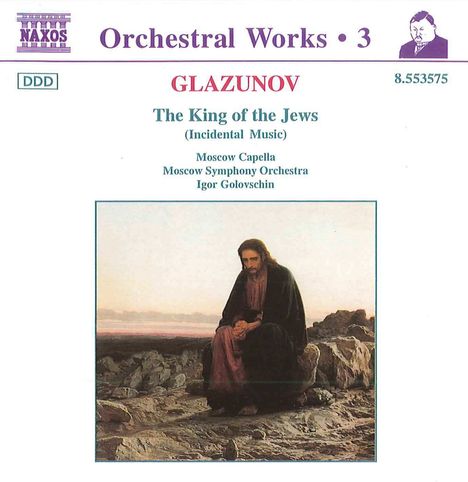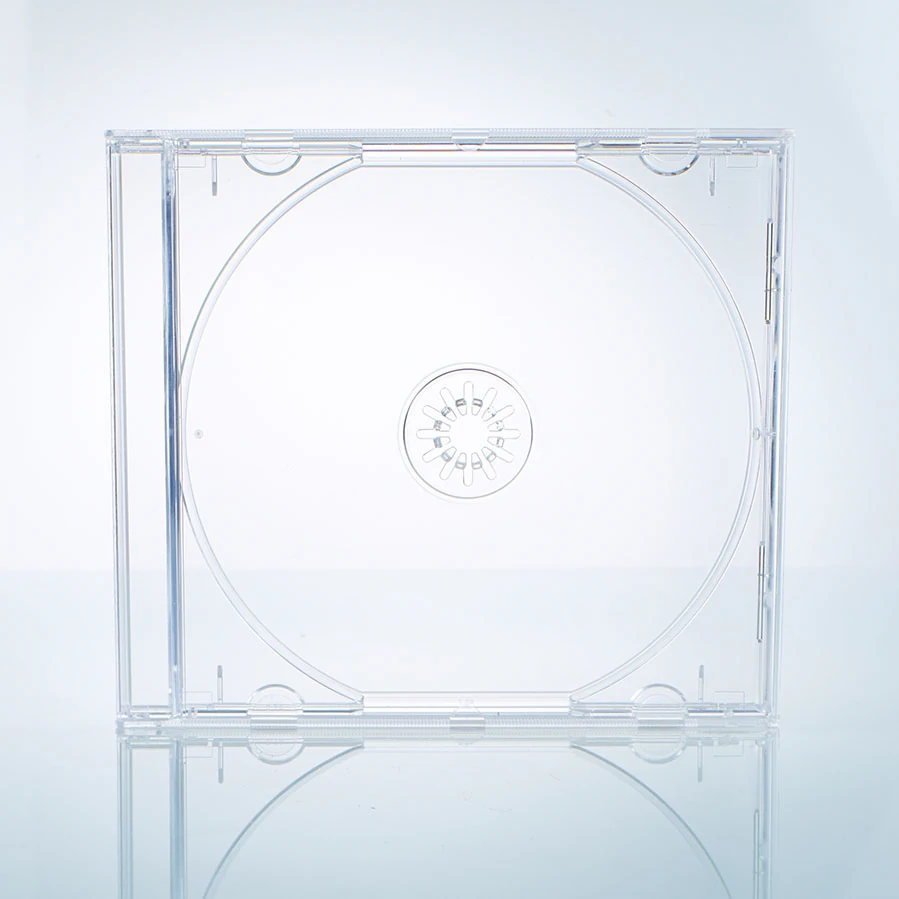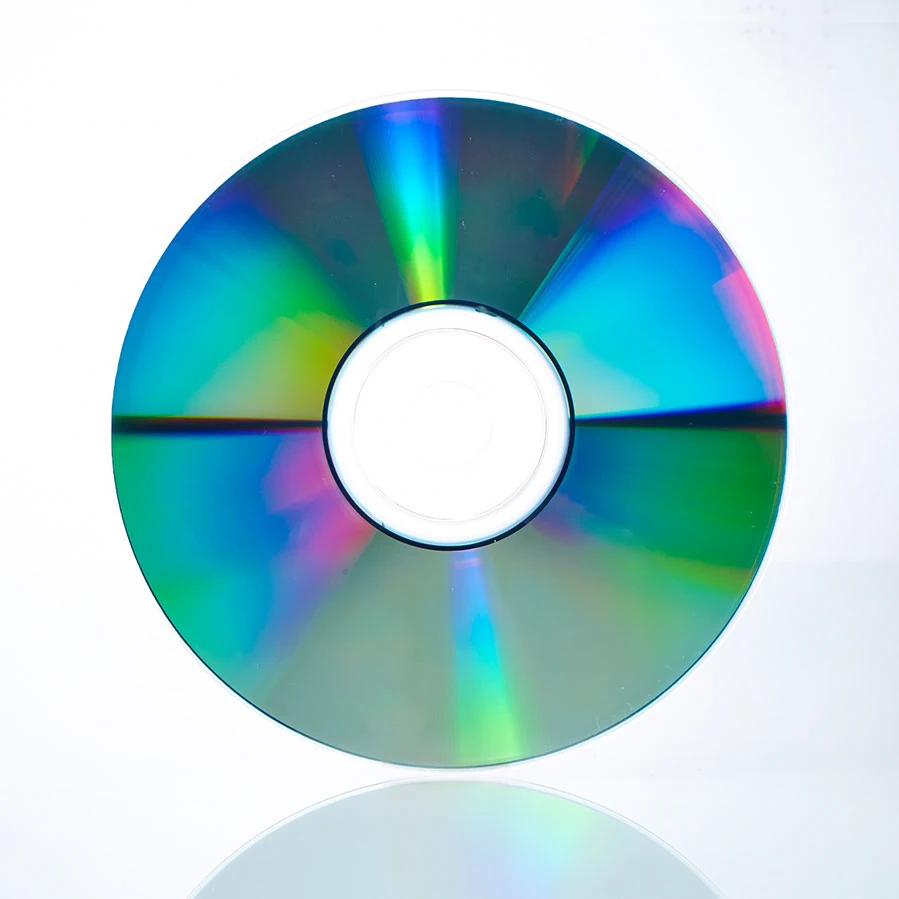Alexander Glasunow: Der König der Juden op.95 auf CD
Der König der Juden op.95
Herkömmliche CD, die mit allen CD-Playern und Computerlaufwerken, aber auch mit den meisten SACD- oder Multiplayern abspielbar ist.
- Künstler:
- Moscow Capella, Moscow Symphony Orchestra, Igor Golovschin
- Label:
- Naxos
- Aufnahmejahr ca.:
- 1995
- Artikelnummer:
- 7813500
- UPC/EAN:
- 0730099457521
- Erscheinungstermin:
- 30.8.1996
Glazunovs Bühnenmusik zu dem Stück Der König der Juden (Zar Iudeyskij) wurde 1913 für ein religiöses Drama des Großherzogs Konstantin komponiert, das in der Eremitage von einer Gruppe von Armeeoffizieren aufgeführt werden sollte. Er arbeitete im Frühjahr 1913 an der Originalpartitur und vollendete sie im Herbst, als er die Musik dem Großherzog im Pawlow-Palast vorspielte. Das Stück wurde am 9. Januar 1914 im Eremitage-Theater uraufgeführt, aber die Musik wurde später in mehreren Städten unter der Regie von Glazunov gespielt.
Die sehr russische Partitur, die Glazunov für das Drama lieferte, beginnt mit einer ruhigen Einleitung, die zum ersten Chor führt, der Christus mit Hosannas begrüßt. Unmittelbar darauf folgt das stark liturgisch geprägte Lied der Jünger Jesu. Der Eingangsakt vor dem zweiten Akt ist wieder deutlich russisch angehaucht. Es folgen die Blechbläser der levitischen Trompeten, und der Akt endet in einer Tragödie. Die Einführungsnummer zur ersten Szene des dritten Aktes führt zu einem düsteren Marsch, während die zweite Szene Einführungsnummer, die stark beginnt, mit einer klagenden Note endet. Der Syrische Tanz gibt einen Hauch von relativer Exotik, während der Schäfer eher eine Pfeife als eine Musette spielt. Die Musik endet mit dem inbrünstigen Psalm der Gläubigen, dem Refrain, der die Offiziere des Ismailow-Regiments so stark ansprach.
Product Information
Glazunov's incidental music to the play The King of the Jews (Tsar Iudeyskiy) was composed in 1913 for a religious drama written by the Grand Duke Konstantin, to be performed at the Hermitage by a group of army officers. He worked on the original score in the spring of 1913, completing it in the autumn, when he played the music through to the Grand Duke at the Pavlov Palace. The play was first performed in the Hermitage Theatre on 9thJanuary 1914, but the music was later played under Glazunov's direction in a number of cities.
The very Russian score that Glazunov provided for the drama begins with a serene Introduction leading to the first chorus, greeting Christ with hosannas. This is immediately followed by the strongly liturgical Song of the Disciples of Jesus. The Entr' acte before the second act is again markedly Russian in feeling. It is followed by the brass of the Levite trumpets and the act ends in tragedy. The Entr' acte to the first scene of the third act leads to a sombre march, while the second scene Entr'acte, opening strongly, ends on a more plaintive note. The Syrian Dance provides a note of relative exoticism, while the shepherd plays a pipe, rather than a musette. The music ends with the fervent Psalm of the Believers, the chorus that appealed so strongly to the officers of the Ismailov Regiment.
Rezensionen
"Brillant. Das ist atmosphärisch und ein exzellentes Beispiel für die Kunstform Bühnenmusik." (Classical Rough and Ready)Disk 1 von 1 (CD)
-
1 Tsar' Iudeyskiy (The King of the Jews), Op. 95: Introduction and Chorus
-
2 Tsar' Iudeyskiy (The King of the Jews), Op. 95: Song of the Disciples of Jesus
-
3 Tsar' Iudeyskiy (The King of the Jews), Op. 95: Entr'acte to Act II
-
4 Tsar' Iudeyskiy (The King of the Jews), Op. 95: Trumpets of the Levites
-
5 Tsar' Iudeyskiy (The King of the Jews), Op. 95: Act II - Conclusion
-
6 Tsar' Iudeyskiy (The King Of The Jews), Op. 95: Entr'acte To Act Iii, Scene 1
-
7 Tsar' Iudeyskiy (The King Of The Jews), Op. 95: Entr'acte To Act Iii, Scene 2
-
8 Tsar' Iudeyskiy (The King of the Jews), Op. 95: Syrian Dance
-
9 Tsar' Iudeyskiy (The King of the Jews), Op. 95: Entr'acte to Act IV
-
10 Tsar' Iudeyskiy (The King of the Jews), Op. 95: Shepherd's Musette
-
11 Tsar' Iudeyskiy (The King of the Jews), Op. 95: Psalm of the Believers
Mehr von Alexander Glasunow
-
Alexander GlasunowKlavierkonzerte Nr.1 & 2CDAktueller Preis: EUR 6,99
-
Alexander GlasunowOrchesterwerkeCDVorheriger Preis EUR 14,99, reduziert um 0%Aktueller Preis: EUR 6,99
-
Alexander GlasunowSymphonie Nr.6CDVorheriger Preis EUR 17,99, reduziert um 0%Aktueller Preis: EUR 4,99
-
Alexander GlasunowSymphonien Nr.1-85 CDsAktueller Preis: EUR 36,99








